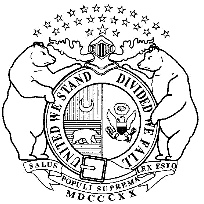
Supreme Court of Missouri
en banc
April 27, 2012
Effective July 1, 2012
Effective July 1, 2012
In re:
Repeal of subdivision (c) of subdivision 4-8.4, entitled "Misconduct," and Comments [3], [4], and [5] thereto of Rule 4, entitled "Rules of Professional Conduct," and in lieu thereof adoption of a new subdivision (c) of subdivision 4-8.4, entitled "Misconduct," and Comments [3], [4], [5], and [6].
ORDER
1. It is ordered that effective July 1, 2012, subdivision 4-8.4(c) of Rule 4 and Comments [3], [4], and [5] thereto be and the same are hereby repealed and a new subdivision 4-8.4(c) and new Comments [3], [4], [5], and [6] adopted in lieu thereof to read as follows:
- 4-8.4 MISCONDUCT
It is professional misconduct for a lawyer to:
* * *
(c) engage in conduct involving dishonesty, fraud, deceit, or misrepresentation. It shall not be professional misconduct for a lawyer for a criminal law enforcement agency, regulatory agency, or state attorney general to advise others about or to supervise another in an undercover investigation if the entity is authorized by law to conduct undercover investigations, and it shall not be professional misconduct for a lawyer employed in a capacity other than as a lawyer by a criminal law enforcement agency, regulatory agency, or state attorney general to participate in an undercover investigation, if the entity is authorized by law to conduct undercover investigations;
* * *
COMMENT
* * *
[3] Rule 4-8.4(c) recognizes instances where lawyers for criminal law enforcement agencies, regulatory agencies, or the state attorney general advise others about or supervise others in undercover investigations and provides an exception to allow the activity without the lawyer engaging in professional misconduct. The exception acknowledges current, acceptable practice of these entities. This exception is not intended to state or imply that an entity has the authority to conduct undercover investigations unless that authority is separately granted to the entity by law. Although the exception appears in this rule, it is also applicable to Rules 4-4.1 and 4-4.3. This exception does not authorize conduct otherwise prohibited by Rule 4-4.2. Nothing in the rule allows the lawyer to advise others about or supervise others in undercover investigations unless the criminal law enforcement agency, regulatory agency, or state attorney general is authorized by law to engage in such conduct.
[4] Rule 4-8.4(g) identifies the special importance of a lawyer's words or conduct, in representing a client, that manifest bias or prejudice against others based upon race, sex, religion, national origin, disability, age, or sexual orientation. Rule 4-8.4(g) excludes those instances in which a lawyer engages in legitimate advocacy with respect to these factors. A lawyer acts as an officer of the court and is licensed to practice by the state. The manifestation of bias or prejudice by a lawyer, in representing a client, fosters discrimination in the provision of services in the state judicial system, creates a substantial likelihood of material prejudice by impairing the integrity and fairness of the judicial system, and undermines public confidence in the fair and impartial administration of justice.
Whether a lawyer's conduct constitutes professional misconduct in violation of Rule 4-8.4(g) can be determined only by a review of all of the circumstances; e.g., the gravity of the acts and whether the acts are part of a pattern of prohibited conduct. For the purpose of Rule 4-8.4(g), "manifest ... bias or prejudice" is defined as words or conduct that the lawyer knew or should have known discriminate against, threaten, harass, intimidate, or denigrate any individual or group. Prohibited conduct includes, but is not limited to, unwelcome sexual advances, requests for sexual favors, and other verbal or physical conduct of a sexual nature when:
(a) submission to that conduct is made, either explicitly or implicitly, a term or condition of an individual's employment;
(b) submission to or rejection of such conduct by an individual is used as a factor in decisions affecting such individual; or
(c) such conduct has the purpose or effect of unreasonably interfering with an individual's work performance or of creating an intimidating, hostile or offensive environment.
[5] A lawyer may refuse to comply with an obligation imposed by law upon a good faith belief that no valid obligation exists. The provisions of Rule 4-1.2(f) concerning a good faith challenge to the validity, scope, meaning, or application of the law apply to challenges of legal regulation of the practice of law.
[6] Lawyers holding public office assume legal responsibilities going beyond those of other citizens. A lawyer's abuse of public office can suggest an inability to fulfill the professional role of lawyers. The same is true of abuse of positions of private trust such as trustee, executor, administrator, guardian, agent, and officer, director, or manager of a corporation or other organization.
3. It is ordered that this order be published in the South Western Reporter.
Day – to – Day
__________________________________
RICHARD B. TEITELMAN
Chief Justice